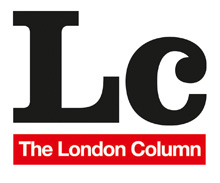Before the Blue Wall. Photo: Homer Sykes, text: Katy Evans-Bush. (4/4)
Posted: July 13, 2012 Filed under: Vanishings, Wildlife | Tags: Homer Sykes, Katy Evans-Bush, LeaValley, Olympic legacy, Olympic site, Walthamstow Marshes Comments Off on Before the Blue Wall. Photo: Homer Sykes, text: Katy Evans-Bush. (4/4)
Anglers on the river Lea. © Homer Sykes 2006.
Katy Evans-Bush:
These two men were fishing in this spot in 2006. For all we know, they’d sat there every available Saturday since they were ten. But we know they’re not sitting there now. It’s in the past – that is, it’s in the Olympic ‘Park’.
The website for the adjacent Walthamstow Marshes says: ‘The reserve is one of the few remaining pieces of London’s once widespread river valley grasslands, and a space to treasure for many reasons!’
The Wikipedia page for the Lower Lea Valley, which means roughly the same place, says ‘the Olympic Games… will provide a legacy of facilities for this currently run-down area. There are plans to redevelop all the derelict and underutilised [sic] parts of the valley, which will take until 2020 or beyond’.
… for The London Column.
A selection of pictures from Before the Blue Wall, Homer Sykes’s project documenting the Lea Valley prior to the Olympic redevelopment, may be seen at the Green Lens Gallery (4a Atterbury Road, London N4 1SF) until the 25th of July. Homer’s website is here.
Before the Blue Wall. Photo: Homer Sykes, text: Tim Wells (3/4)
Posted: July 12, 2012 Filed under: Transport, Vanishings | Tags: greasy spoon, Homer Sykes, Joe Public, Olympic Park, Tim Wells Comments Off on Before the Blue Wall. Photo: Homer Sykes, text: Tim Wells (3/4)Transport cafe, Hackney Marshes. © Homer Sykes 2006.
My Bitch Up
Burning Geronimo through the East End, the motor skittish at jump, stop, start.
Music blasting out the windows, slapping Joe Public in the face as we roar by.
Tossing the used notes behind us, dirty knees and carpet burn noses.
Each staccato burst spent, surly, and spittin’ in the eye of every pocket money massive.
On Commercial Road some City boy lone ranger races us red light to red light,
every green a pistol shot.
At Limehouse John John faces him and mouths, “Ours is stolen.”
The silence: single mum heavy. Someone drops the sprog.
© Tim Wells.
A selection of pictures from Before the Blue Wall, Homer Sykes’s project documenting the Lea Valley prior to the Olympic redevelopment, may be seen at the Green Lens Gallery (4a Atterbury Road, London N4 1SF) until the 25th of July. Homer’s website is here.
Before the Blue Wall. Photo: Homer Sykes, text: Henry Newbolt (1862-1938) (2/4)
Posted: July 11, 2012 Filed under: Sport | Tags: Henry Newbolt, Lea Valley, Olympic Park, Play Up and Play the Game 2 CommentsHackney Marsh sports field. © Homer Sykes 2006.
Vitai Lampada
(“They Pass On The Torch of Life”: 1892)
There’s a breathless hush in the Close to-night
Ten to make and the match to win
A bumping pitch and a blinding light,
An hour to play and the last man in.
And it’s not for the sake of a ribboned coat,
Or the selfish hope of a season’s fame,
But his Captain’s hand on his shoulder smote
‘Play up! play up! and play the game!’
The sand of the desert is sodden red,
Red with the wreck of a square that broke;
The Gatling’s jammed and the Colonel dead,
And the regiment blind with dust and smoke.
The river of death has brimmed his banks,
And England’s far, and Honour a name,
But the voice of a schoolboy rallies the ranks:
‘Play up! play up! and play the game!’
This is the word that year by year,
While in her place the School is set,
Every one of her sons must hear,
And none that hears it dare forget.
This they all with a joyful mind
Bear through life like a torch in flame,
And falling fling to the host behind
‘Play up! play up! and play the game!’
David Secombe:
Henry Newbolt was a popular poet of the late Victorian and Edwardian era, and this once popular poem, with its image of sacrificial glory transferring seamlessly from the cloisters of Clifton College to the Sudan desert, was much reviled after the first World War. In his later years, Newbolt himself became embarrassed by it, but there is no question that in his prime he was the figurehead of nationalistic poetry in England. Its inclusion here was suggested by a poet friend, and she might have invoked it as a bilious response to the current move to incorporate ‘poetry installations’ into the Olympic theme park. Or maybe she was just in an elegiac mood.




